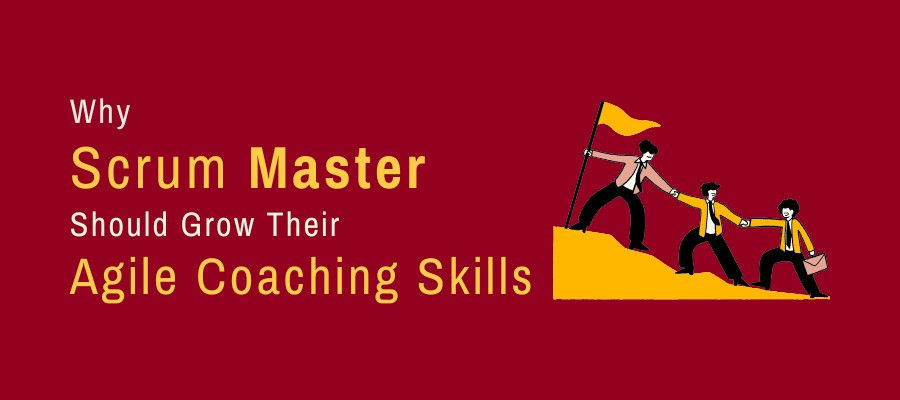Why Scrum Masters Should Grow Their Agile Coaching Skills

Scrum Masters play a vital role in any Agile team, but their impact often stays limited when they only operate within the boundaries of team-level facilitation. As organizations evolve and scale Agile practices, the demand for Agile Coaches to support transformation across teams and departments increases. That’s precisely where a Scrum Master with coaching skills becomes invaluable. Growing coaching capabilities isn’t just about career elevation. It is about enabling broader change, inspiring teams, and driving continuous organizational improvement. The shift from Scrum Master to Agile Coach opens new dimensions of influence, depth, and purpose.
From Team-Level Enabler to Organizational Change Agent
A Scrum Master supports a single team’s Agile journey by removing blockers, improving collaboration, and ensuring Scrum practices are followed. However, as businesses scale, Agile transformation requires more than team-level facilitation. It demands cultural change, leadership alignment, and systems thinking. An Agile Coach steps into this gap. They work across functions, mentor leaders, and build coaching capabilities into an organizational DNA. By developing Agile coaching skills, a Scrum Master can move beyond tactical execution and step into a role that enables systemic transformation. This transition is both challenging and fulfilling and requires deliberate learning and reflection.
What Agile Coaching Skills Should Scrum Masters Focus On?
To evolve into an Agile Coach, Scrum Masters must expand their toolbox far beyond the Scrum framework. The eight stances of Agile coaching—coaching, mentoring, teaching, facilitating, advising, serving, leading, and transforming—represent a broad skillset that must be developed. Start by deepening your facilitation skills, foundational to any coaching engagement. Then, focus on building your listening skills, emotional intelligence, and coaching ability without giving solutions. You must also sharpen your leadership coaching skills to work effectively with stakeholders and senior leaders.
How to Acquire These Skills and Evolve Your Mindset
Growing your coaching capabilities is not just about taking courses. It’s a mindset shift that embraces curiosity, humility, and continuous learning. Start by reflecting on your current stance—are you showing up more as a problem-solver or a space-holder? Engage in regular self-reflection and journaling. Practice powerful questioning and active listening in everyday conversations. Participate in meetups and coaching circles to observe how experienced coaches operate. Read foundational books like “Coaching Agile Teams” by Lyssa Adkins or “The Coaching Habit” by Michael Bungay Stanier. Actual growth happens when you apply what you learn in real-world scenarios and use feedback to fuel evolution.
Finding a Mentor and Practicing in Safe Spaces
Having a mentor is one of the most valuable ways to grow as an Agile Coach. Look for someone who has walked the same path, understands the challenges, and is willing to provide guidance and honest feedback. Many coaches start by co-facilitating workshops or shadowing experienced professionals. If your organization has an internal coaching guild or community of practice, join it. If not, find one externally. These spaces give you opportunities to learn, experiment, and fail safely. Coaching is a muscle that grows with use. So, the more you practice in real scenarios, the more confident and effective you become.
Bridging the Gap with Real-World Experience
The transition from Scrum Master to Agile Coach does not happen overnight. It requires hands-on experience that goes beyond your existing team. One practical approach is volunteering for cross-team initiatives like Agile transformations, team health assessments, or large-scale retrospectives. These experiences allow you to take a coaching stance in real business scenarios.
Try facilitating leadership workshops, working with Product Owners, or observing team dynamics outside your comfort zone. The goal is to build the muscle of systems thinking and organizational coaching slowly. Every interaction becomes a chance to shift perspectives, influence mindsets, and support behavioral change. This field experience complements formal training and helps Scrum Masters turn knowledge into wisdom.
The Role of Training and Certification
Structured training plays a critical role in skill acquisition. Certifications like ICAgile’s Agile Coaching (ICP-ACC), Certified Agile Coach (ICP-ENT or ICP-CAT), and Scrum Alliance's Advanced Certified ScrumMaster (A-CSM) and Certified Agile Coach credentials help build both credibility and competence. These programs don’t just offer frameworks. They teach facilitation, mentorship, and coaching mindsets. A good training program also includes real-time coaching labs, roleplays, and feedback from peers and instructors. Training should never be about the certificate alone. Choose programs that challenge you, expose your blind spots, and stretch your thinking beyond frameworks.
Can a Scrum Master Coach Not Be a Certified Agile Coach?
Absolutely. You don’t need a certification to begin coaching. However, you do need intention, preparation, and ethical awareness. Coaching requires maturity—knowing when to coach, mentor, and teach. Start coaching informally, ask for feedback, and gradually expand your influence. As you gain experience, certifications can help formalize your growth and give you more access to opportunities.
How PremierAgile Supports Scrum Masters Becoming Agile Coaches
PremierAgile understands the unique journey Scrum Masters go through when stepping into coaching roles. That’s why they’ve curated hands-on, practitioner-led training programs that go far beyond theory. From foundational facilitation workshops to advanced Agile Coaching certifications, every program is designed with real-world transformation in mind. Their trainers are seasoned coaches who share insights from years of experience working with Agile teams across industries.
In addition, PremierAgile provides access to mentorship circles, post-training coaching labs, and a vibrant alumni community. These resources allow Scrum Masters to continue growing even after formal training ends. Whether you want to build facilitation skills, learn coaching techniques, or prepare for coaching certification, PremierAgile offers a comprehensive support system to help you succeed. If you want to become a trusted Agile Coach who drives change at scale, PremierAgile is the right partner for your journey.
Start your journey to become an Agile Coach with PremierAgile today!
Reference:
https://resources.scrumalliance.org/Article/scrum-masters-grow-agile-coaching-skills




